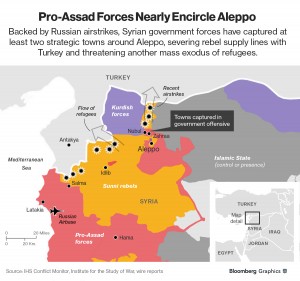There’s only one major group of combatants in the Syrian war that’s backed by both Russia and the U.S. — and now Turkey is attacking it.
For a fourth day on Tuesday, Turkey unleashed its 155-millimeter heavy guns across the border with Syria. The targets were Kurdish forces, whose recent advance is a key part of the Russian plan to restore President Bashar al-Assad’s control over Syria.
Syria’s five-year war has turned into a tangled web of proxy conflicts between global and regional powers, with a growing risk that some of them could clash directly. Right now the most dangerous flashpoint is between Russia and NATO member Turkey, which shot down a Russian plane in November. Since then tensions have steadily built as the Assad-Russia alliance — with help from the Kurds — threatens to surround Turkish-backed rebels in Aleppo, Syria’s biggest city.
“Both Russia and Turkey are looking to position for strategic advantage,” Tim Ash, head of emerging-market strategy at Nomura in London, said by e-mail on Monday. “The risk is of an actual Russo-Turkish military clash, which would then threaten to draw in NATO.”
‘Accidental’ War
The irony is that even while Turkey faces off against NATO foe Russia, its policies are also putting it at odds with leaders of the Western coalition.
The U.S. shares Turkey’s desire to halt the Assad advance, and its suspicion of Russian intentions. But on the subject of Syria’s Kurds, there’s a sharp difference.
Turkey says the main Kurdish fighting unit, the YPG, is a terrorist group that’s in league with autonomy-seeking militants inside Turkey. The U.S. views the Syrian Kurds as a proven battlefield ally against Islamic State. Two weeks before Turkey started shelling them, President Barack Obama’s envoy for the coalition against Islamic State, Brett McGurk, was visiting YPG fighters in Syria to congratulate them.
Turkey says its attacks on the Kurds were in retaliation for cross-border shooting, and most analysts say it’s unlikely to carry out a major incursion that would put its troops under Russian fire. But the risk of an “accidental” clash is increasing, according to Nihat Ali Ozcan at the Economic Policy Research Foundation in Ankara.
Once Friends
Turkey’s lira slid to a three-week low on Tuesday as the shelling fueled concerns of a wider conflict in Syria, where at least a quarter-million people have already died.
The once-friendly relationship between Ankara and Moscow has deteriorated since Russia entered the Syrian war on Assad’s side last September. The rebels backed by Turkey and other U.S. allies, including Saudi Arabia, have been withering under Russian bombing that has helped Assad regain territory.
For Turkish President Recep Tayyip Erdogan, two threats are unfolding simultaneously. In the short term, a Russian-backed Kurdish advance could cut supplies to the rebels that Turkey’s been backing for years, increasing the chance that Assad will recapture Aleppo and survive in power. That would be the latest blow to Erdogan’s policy in the Middle East, a region of growing economic importance for Turkey: he’s already lost allies in Egypt and Iraq.
In the longer term, Turkey is wary of territorial gains for the Syrian Kurds that could eventually deliver them a state of their own, and fuel similar aspirations among Turkey’s Kurdish minority. Erdogan says Russian airstrikes are allowing the Kurds to drive ethnic Turkmens and Arabs away from the border areas, deepening the refugee crisis.
‘Reciprocal Restraint’
Like other U.S. allies in the region, Turkey has been pinning its hopes for a turnaround on Washington’s leadership. Turkey would definitely join a ground operation with its international partners to end the Syrian war, a Turkish official said at a briefing in Istanbul on Tuesday, speaking on condition of anonymity. The official ruled out a unilateral incursion by Saudi Arabia, which has made a similar offer of troops, or Turkey.
The U.S. appears to be backing diplomacy rather than military escalation, though the truce it brokered last week with Russia and other powers has run into trouble even before it was due to take effect. Obama told reporters on Tuesday that the cease-fire probably won’t work “if Russia continues indiscriminate bombing.”
The U.S. has acknowledged some of Turkey’s concerns. In a phone call with Turkish premier Ahmet Davutoglu, Vice President Joe Biden said efforts were being made “to discourage Syrian Kurdish forces from exploiting current circumstances to seize additional territory near the Turkish border,” the White House said on Sunday. But Biden also urged Turkey “to show reciprocal restraint by ceasing artillery strikes in the area.” Members of the UN Security Council expressed concern about the Turkish attacks at a meeting on Tuesday, the Associated Press reported.
Russia has been carrying out military exercises in the Black Sea area that are “a signal to Turkey not to stage a provocation,” according to Igor Korotchenko, director of the Center for Analysis of World Arms Trade in Moscow.
‘Enough Forces’
“We have enough forces to bring Erdogan back to his senses if Turkey forces us to act militarily,” Korotchenko said.
Turkey’s actions on the border are defensive steps to avoid a war, Davutoglu said on Tuesday. A day earlier, he denied reports that Turkish troops had crossed into Syria.
All the rhetoric shows that, while the risk of a clash between major powers in Syria may be exaggerated, it’s “still real,” said Michael Gunter, author of several books on the Kurds and a professor of political science at Tennessee Tech University in Cookeville.
If Turkey takes further action to counter the Kurds and Russia, he said, “things could quickly escalate into a greater confrontation which nobody in their correct mind would want.”




1 Comment / 1 Comment